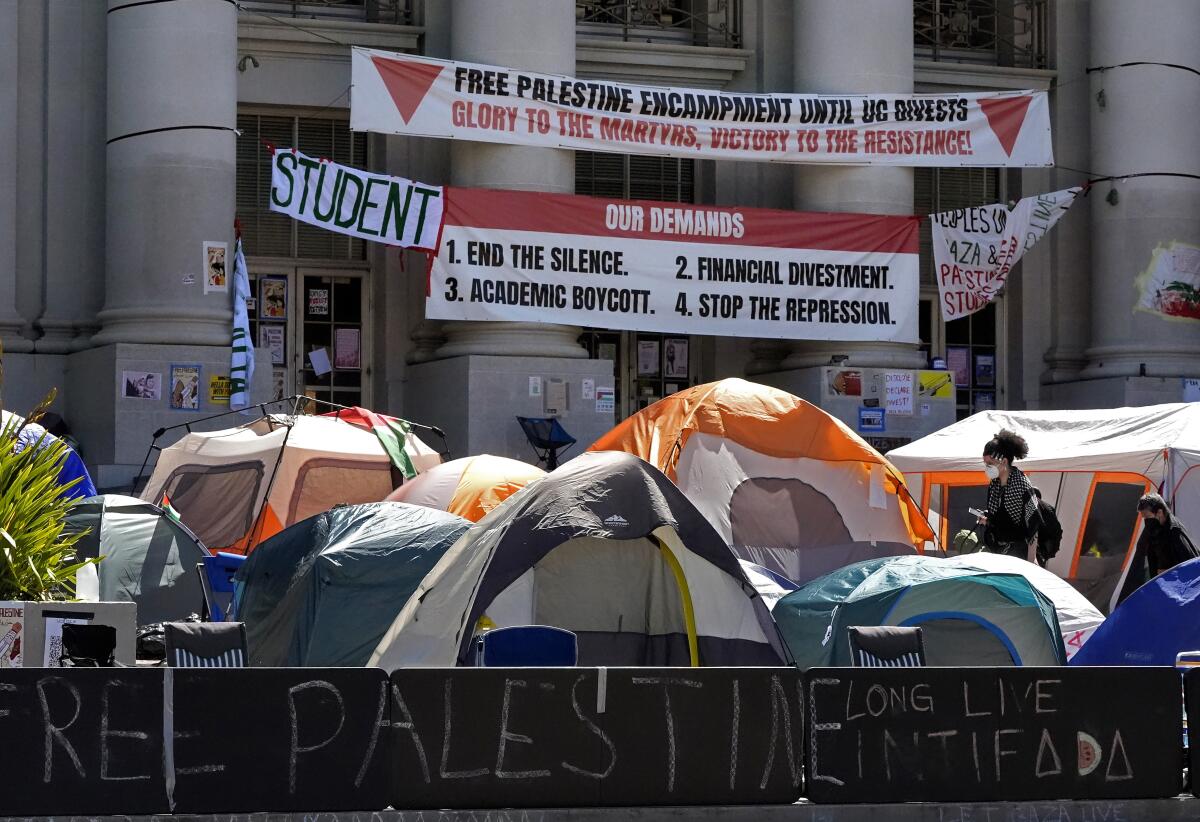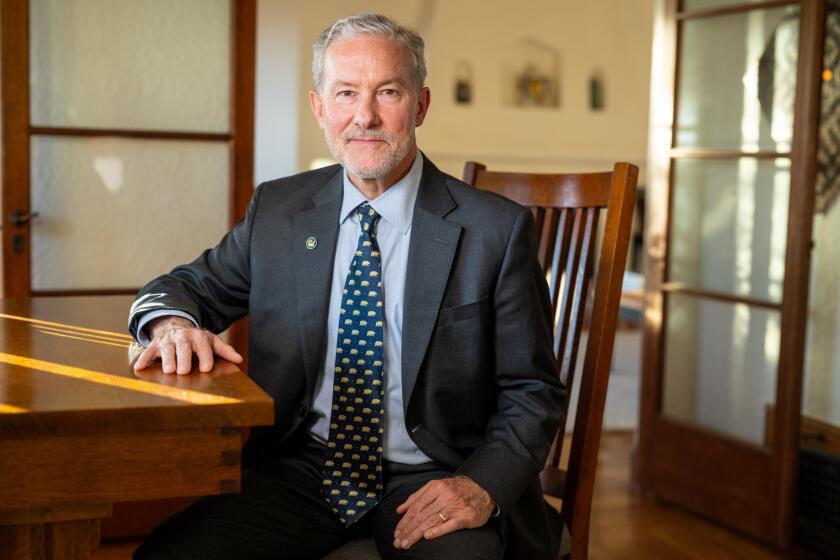After protests, UC Berkeley pledges to expand antisemitism education to all new students

UC Berkeley will expand antisemitism education to all incoming students beginning this fall, after pro-Palestinian protests over the Israel-Hamas war fueled anxieties among many Jewish campus members, Chancellor Carol Christ announced this week.
For the first time, the campus will provide a five-year funding commitment to widen the educational effort, which began on a much smaller scale in 2019, to all new students, leaders of official student organizations and residential assistants. Berkeley also will strengthen the Center for Jewish Studies with a new designation that will allow it to have its own endowed chairs and faculty members and launch faculty searches. A new Israel Studies minor, which has been in the works for years, will begin this fall.
The new programs will aim to counter the “deeply disturbing” rise in antisemitism at Berkeley and elsewhere since the Oct. 7 Hamas attack in southern Israel, Christ said in a letter to members of her advisory committee on Jewish student life and campus climate.
“I understand and acknowledge that many members of our Jewish community felt deeply disturbed, even unsafe, due to the presence and persistence of expression that was reasonably perceived to be antisemitic,” Christ wrote. “You can be confident that there is no complacency among campus leadership on these issues.”
Berkeley has been rocked by accusations that it fails to safeguard Jewish students and combat antisemitism, which campus officials deny. The U.S. Department of Education’s civil rights office and a House committee are investigating the campus response to such allegations. Jewish groups also have sued the university for what their lawsuit called the “longstanding, unchecked spread of anti-Semitism” — an accusation Berkeley Law School Dean Erwin Chemerinsky called “stunningly inaccurate.”
A Wall Street Journal op-ed by professor Steven Davidoff Solomon recommended against hiring students who ‘support discriminatory bylaws or other acts and resolutions blaming Jews and Israelis for the Hamas massacre.’
Christ has drawn criticism from some Jewish community members after signing an agreement in May with pro-Palestinian protesters to dismantle their encampment on Sproul Plaza. In exchange, she said she would support a review of campus investments to make sure they align with Berkeley’s values upholding equality, human rights and abhorrence of war. Christ also pledged a review of complaints about global exchange and internship programs for any discrimination against Palestinians and others.
Some Jewish critics believed the agreement gave protesters unjustified concessions without consequences for violating campus bans on overnight camping and other rules. Others feared that the reviews of campus foundation and endowment holdings, along with global exchange programs, would open the door to boycotts, divestment or sanctions targeting Israel, said Ethan Katz, a Berkeley faculty member who chairs the advisory committee and directs the Jewish studies center.
But Christ, in her letter, clarified that the commitments with protesters confirmed existing campus policies around human rights and discrimination and did not target Israel.
“I have repeatedly expressed my opposition to any UC-wide, campus or Foundation policy that would boycott, divest from or impose sanctions upon Israel,” she wrote.
Rich Lyons, former Berkeley business school dean and now chief innovation and entrepreneurship officer, will lead one of the nation’s top public universities.
Katz said Christ has worked hard to listen to Jewish community concerns and respond to them since the Oct. 7 attack — and particularly after the encampment went up in April. Although the encampment was largely free of violence, he said, the protest slogans and signs demonizing Israel and Zionism at times spilled into antisemitism and created fear and anxiety among many Jewish campus members, he said.
“That really made the environment feel very hostile to a lot of students,” Katz said.
But Katz said he never called for the encampment to be removed and shared Christ’s desire to avoid the violent encounters with police that occurred at UCLA, Columbia and the University of Texas at Austin. He also said he opposed efforts to “weaponize” accusations of antisemitism to silence all pro-Palestinian speech or promote other political agendas.
Jewish campus members at UC Berkeley quashed a move to bring in pro-Israel outsiders to stage a counterdemonstration, fearing that could lead to the kind of melee that roiled UCLA.
Katz called Christ’s letter “reassuring” in reiterating the university’s position against divestment from or boycott of Israel, and in favor of robust academic exchanges and support for Israel studies programs.
But he said Jewish community members remain concerned about what may unfold once students return to classes in the fall and whether protesters who violate campus regulations will be held accountable. Katz said he hoped to see the campus strike a middle ground between mass arrests and no consequences.
Christ, in her letter, said the campus is reviewing its regulations around protests.
More to Read
Sign up for Essential California
The most important California stories and recommendations in your inbox every morning.
You may occasionally receive promotional content from the Los Angeles Times.













